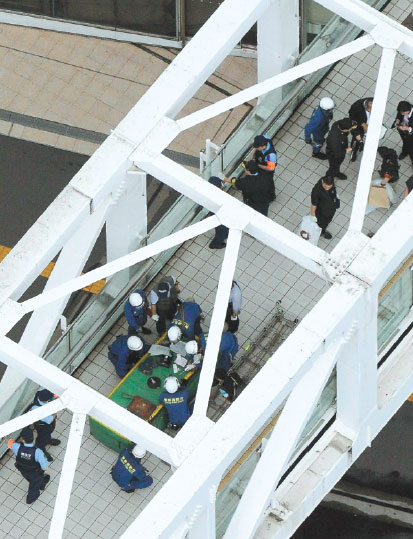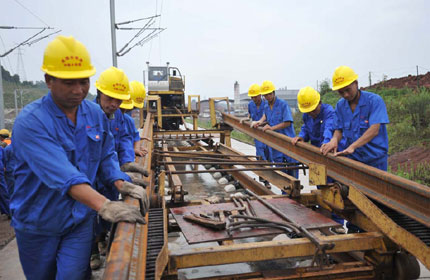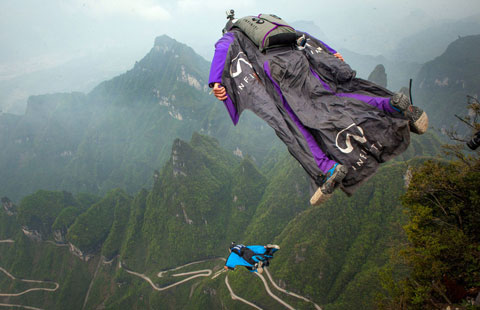Japan pushes for military reform
Updated: 2014-07-01 07:41
By Agencies in Tokyo (Agencies)
|
|||||||||||
|
Police officers investigate the site where a man set himself on fire near Shinjuku railway station on Sunday in Tokyo. The man set himself on fire in a protest against Japanese Prime Minister Shinzo Abe's plans to revise the country's pacifist Constitution, police said. Photo by Kyodo via Reuters |
Protester attempts to commit suicide over Constitution changes
Japan's government will press ahead with divisive plans to loosen restrictions on its military, a top government spokesman said on Monday, despite widespread public anger and a protester's horrific suicide bid.
Hundreds of people in the busy Tokyo district of Shinjuku watched on Sunday afternoon as a middle-aged man in a suit set himself ablaze above a footbridge, after making a speech opposing moves to let Japan's well-equipped military fight on behalf of allies.
The dramatic suicide attempt was widely discussed on social media in both English and Japanese, with numerous videos and photographs posted by onlookers.
Many Internet users made the connection between the self-immolation and a groundswell of opposition to Prime Minister Shinzo Abe's push to relax constitutional rules preventing Japan's armed forces from going into battle.
Abe says growing regional tensions mean Japan must be better prepared to defend itself.
The conservative premier's plans are supported by the United States, Tokyo's chief ally, but are highly controversial at home, where voters are deeply wedded to the pacifism Japan adopted after World War II.
The government's chief spokesman Yoshihide Suga on Monday refused to comment on the suicide attempt, which he said was a police matter, but confirmed that the Cabinet would push ahead on Tuesday with plans to change the interpretation of part of the pacifist Constitution.
Under the current reading, Japan's large and well-trained military is barred from taking any action, except in very narrowly defined circumstances in which the country is under attack.
"We are in the final stage of the coordination between the ruling parties," Suga told reporters. "Once the consensus is made between the ruling parties, we will have it approved by the Cabinet tomorrow."
Public opposition
Thousands of people marched in Tokyo on Monday to denounce the landmark shift in security policy.
Organizers said 10,000 demonstrators joined the march. Some carried banners saying: "I don't want to see our children and soldiers die" and "Protect the Constitution".
The latest polls also suggest at least half the population is against a more aggressive military stance.
The liberal Mainichi newspaper said over the weekend that 58 percent of voters are opposed, while the Nikkei business daily, in its poll published on Monday, said 50 percent of respondents were against the change.
But Suga defended the plan, saying: "The government should protect people's lives and property as well as the country's safety ... and if there is a defect in the current legal framework, we will address it."
The suicide bid received scant coverage in the mainstream media - which is sometimes criticized as servile - with none of the national newspapers using a picture in their short reports.
Broadcaster NHK, whose chairman caused outrage earlier this year by suggesting that the state-funded body should not contradict the prime minister, did not cover the self-immolation on the day.
Today's Top News
China, Germany join hands to drive growth
Meet foreigner breed of workers
Product placement deal backfires
From Westlife to the East
Gambling costs World Cup fans their lives
US supports Ukraine's decision to suspend ceasefire
It's all about making a spectacle
China likely to see 7.5% growth in second quarter
Hot Topics
Lunar probe , China growth forecasts, Emission rules get tougher, China seen through 'colored lens', International board,
Editor's Picks

|

|

|

|

|

|






